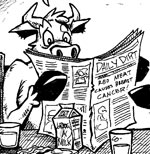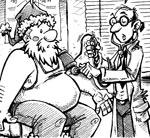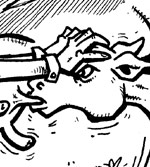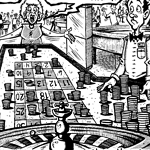Transient Insomnia - Dealing with Insomnia That Lasts a Week or Less
| Share on Facebook | Share on Twitter | Share on Google+ |
Transient insomnia, also known as short-term insomnia, is an inability to sleep that lasts a week or less. The causes of transient insomnia are usually situational. The good thing about transient insomnia is that it doesn't last very long.
Adjustment Sleep Disorders
By far the most frequent cause of transient insomnia is "adjustment sleep disorder," a change in lifestyle that triggers anxiety. Adjustment sleep disorders are common during exam week on college campuses and during hurricane season in coastal locations. They occur after the death of a loved one or a sudden financial reversal.
As long as the anxiety about the event does not become generalized to life in general, adjustment sleep disorders usually only last a day or two. This makes them especially appropriate for treatment with medication, as long as the medication is not used for more than a week.
Caffeinism
Another common cause of transient insomnia is caffeinism, the overuse of foods and beverages containing caffeine. Not everyone responds to caffeine the same way. Due to hereditary differences in liver enzymes, some of us process caffeine quickly, and others much more slowly. And body size makes a difference in how much caffeine keeps us up.
If you weigh 100 kilos (220 pounds), then three cups of brewed coffee will interfere with your ability to fall asleep, even if you drink that coffee for breakfast. The effect increases up to six cups, and then drinking more coffee does not cause worse insomnia (not that it's a good idea to drink six cups of coffee for breakfast). If you weigh more or less than 100 kilos, then it will take more or less coffee to interfere with sleep.
How long coffee keeps you up, however, depends on how fast your liver processes caffeine, and how good your liver health is. The better your liver health, the less the effects of caffeine. If you must have your coffee, don't drink alcohol!
Jet Lag
When you travel to a different part of the world, the sun comes up and goes down at times your body does not expect. You may want to sleep during the day and wake up in the middle of the night for 2 days to 2 weeks.
What's the easiest way to deal with jet lag? If you are already in your destination country, treat your jet lag with caffeine—but at the right time of day.
For nearly 50 years, sleep scientists believed that the effects of jet lag took place mainly in the brain. Now researchers recognized that it is the adrenal glands that need resetting to respond to normal hours of sleep and waking activities in the new location.
The adrenal glands unload the largest amount of the stress hormone cortisol during the pre - dawn hours to simulate a wake-up call. Drinking strong coffee at breakfast, at the time you would like to have breakfast every day, will have a similar effect in your new location. Avoid caffeine the rest of the day.
Selected References:
Carmichael CL, Reis HT. Attachment, sleep quality, and depressed affect. Health Psychol.2005;24:526–31.
Harrington M. Location, location, location: important for jet-lagged circadian loops. J Clin Invest. 2010 Jul 1;120(7):2265-7. doi: 10.1172/JCI43632. Epub 2010 Jun 23. Review.
LeBourgeois MK, Giannotti F, Cortesi F, et al. The relationship between reported sleep quality and sleep hygiene in Italian and American adolescents. Pediatrics. 2005;115(Suppl 1):257–65
-
Skin CareMen Skin Care
-
Free ResourcesFree eBooks
-
When it comes to eating right and exercising, there is no "I'll start tomorrow." Tomorrow is disease.Terri Guillemets
-
Featured Health Supplement
 If you find a product that is as effective as Total Balance, and is better value for money, let us know and we will give you a refund equivalent to your entire purchases of Total Balance…retrospective.
If you find a product that is as effective as Total Balance, and is better value for money, let us know and we will give you a refund equivalent to your entire purchases of Total Balance…retrospective.
-



















